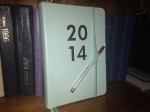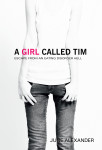Meet my friend, the diary
Meet my friend, the diary
When I was 13 years old, I physically attacked a city cousin who was twice as big as me. I was outdoors, helping on the farm, when another cousin disclosed rather flippantly that her brother was reading the diary that I kept under my pillow. I raced to the farmhouse, knocked my intruder cousin to the ground and sat on him, pummeling him and threatening all sorts of painful deaths if he dared to read so much as one page of my diary ever again.
When I was 18, I discovered my mother was reading my diary. For a time, I wrote in shorthand and code, to deflect her prying eyes.
Privacy with my diary was absolutely crucial. The diary was me and I was it. We were one. This is how it was, for decades.
I have been reflecting on how I reached the decision, 40 years later, to share diary entries in my memoir, A Girl
Called Tim. I think it had something to do with desperation. I had kept ‘this other life’ within, for decades, and my family of origin did not seem to understand, despite my many efforts to explain (in countless letters, unacknowledged – I would phone my mother a few days after sending a letter, and she would not mention it; she found it easier to talk about the weather, about her friends who were ill, and about how weary my hard-working father was ‘but he never complains’; when I summoned the courage to ask if she had received my letter she would invariably say ‘I haven’t time to listen. I must go now, goodbye’).
In short, my parents and sister for whatever reason did not meet my need for understanding and acceptance, even when, at age 55, I had crossed the line into recovery. I guess in a way their attitude had helped me, because I was determined to show them that beyond my illness, I really was an ‘okay’ person; that I did not deserve the tag of ‘the one with the problems in the family’. I guess that as time went on, I became just too complicated for them and by the time I had recovered my true self, they were set in their ways and it did not suit them, or maybe they did not know how, to accept me.
So, when you have lost so much, such as family of origin, you can only go one of two ways – be a victim and surrender to a debilitating non-life, or put your story out there and have it confirmed by the Universe one way or the other – are you the only person in the world who thinks and feels like you do, or is there maybe another person who is suffering like you. In this way, I had nothing more to lose – my memoir could confirm I was the ‘problem in the family’, that I was weak-minded, irresponsible, and not worthy of respect or inclusion in family matters; or that I actually had had a biologically-based mental illness, that had explanations and affected other people, and if they were feeling lost and misunderstood like I had felt for decades, I could let them know they were not alone. Isolation, alienation and rejection are among the most painful outcomes of an untreated eating disorder.
Some people write memoirs very soon after recovery. I waited until I was in my 50s, until I knew, deep inside that my sense of self had been rebuilt, and was strong enough to cope with whatever life served ‘out there’. The journey since A Girl Called Tim was published in 2010, has been amazing.
I lost my family of origin due to my illness, but in recovery and through sharing my story, gained a life.
Certainly it is important to define the diary as a very private tool for sharing and connecting with one’s most inner self; which is different from the memoir, a collection of stories from one’s life.
I began writing a diary on my 12th birthday, about nine months after I had developed Anorexia Nervosa. The early pages were full of cricket scores, calories and numbers of hours walked. As the years rolled by, I gradually began to express thoughts and feelings through my pen, onto the pages of the diary. I built up a relationship with the diary, connected with it, poured my secrets and frustrations into it. I would ask my mother questions and she would say ‘we don’t talk about those things’, ‘that happened a long time ago’, ‘keep yourself busy, you think too much’. So I would write in my diary and seek answers that way.
I continue to write a diary but these days my inner and outer self are one, both mind and soul content. My grand children love to watch me writing an entry and sometimes they ask if they can write something too. ‘Of course’, I say. One day, the diaries will belong to them.
I mention all this because I am writing a book called ‘The Diary Healer‘.
The Diary Healer explores how the diary can help understand, inspire, heal and liberate self and provide a learning tool for others.
* If you keep or have kept a diary or journal, I would love to hear from you. What has your diary meant to you? Write to june@junealexander.com







